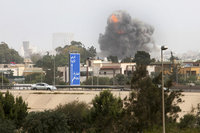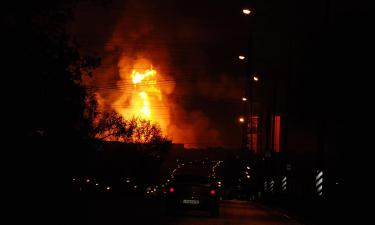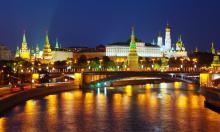The West does not understand Libya after Gaddafi
 The situation in Libya has been a central topic for the world media for several months. What is happening in this country? Why is Gaddafi still in power? How did he manage to win the confidence of his people? Alexander Rogovoy, a Major-General, senior military adviser to Libya in the mid 2000's, Associate Professor of General Staff of the Military Academy, shared his vision of the situation in Libya in an interview with Pravda.ru.
The situation in Libya has been a central topic for the world media for several months. What is happening in this country? Why is Gaddafi still in power? How did he manage to win the confidence of his people? Alexander Rogovoy, a Major-General, senior military adviser to Libya in the mid 2000's, Associate Professor of General Staff of the Military Academy, shared his vision of the situation in Libya in an interview with Pravda.ru.
"For work you had to communicate with the family of Colonel Gaddafi. Can you tell us about your impression of him?"
"I communicated more with one of the sons of al-Gaddafi. He was an ordinary, normal, fairly intelligent young man who was studying in Russia at the Frunze Academy and the Academy of General Staff. He was very serious about issues he studied. In daily life he was sociable, polite to the elderly, as, probably, required by the rules of the Islamic world.
As for the colonel, the thing that struck me here in Libya was that the country lived its life: portraits of Gaddafi could be hanging, or could be lying on the ground. People could walk on them, but no one was punished for that."
"This country has a fairly high standard of living. How does it manifest?"
"Every young family after the wedding would receive approximately 64 thousand dollars free of charge from the state. This money could build a decent house. A car could be purchased on a 30-40 years mortgage. Sometimes a father would begin to pay the mortgage, and his son would continue payments, with no interest. In Libya, in terms of Russian money, a liter of 95-octane gasoline cost 12-15 cents, superbly refined gas. There are no utilities payment. No one pays for electricity, water, or anything else. Once there was a case when the government had to relocate one tribe from the Sahara, because it was too expensive to deliver water there and everything else.
You cannot say that the country is a closed one because satellite dishes are sticking out from every window. There is completely free education; in addition, there are no exit exams in schools. A-students receive the right to go wherever they want - at the state expense, even in foreign universities. Those who are A- and B-students are entitled to study for free in local universities. C students study in professional schools.
There were many foreign specialists working in the country. They had a preferential treatment: for the same job they were paid more than the locals. If the Arabs were paid $300, foreigners were paid $800. Of course, life in Libya cannot be compared with the standard of living in the Emirates, Kuwait, or Bahrain. But it was normal - people were not poor. There were no beggars. One day in some city I saw a beggar, was surprised and decided to give him some money. He complained I gave too little."
"Is this why Gaddafi managed to stay in power for so long?"
"He is not a stupid leader, he was educated both abroad and at home. His "Green Book" is the inverse image of the Constitution. There is an Arabic word "motamarat." It means "general election," when they choose leaders starting anywhere from a supervisor of an apartment building to the country's leader. The elections take place simultaneously across the country within three days. Regardless of transparency, the elections are held.
"What then is the reason for the outbreak of popular uprisings?"
"Local young people got bored, and went out into the streets. Libya is a traditional Arab country; there is no familiar to us entertainment - theater, dancing, etc. They just stay home, smoke shisha and watch TV. That's why they are looking at Europe.
Moreover, Libya is a tribal country. Benghazi was always sort of an opposition city - there once lived a family of King Idriss. I was told by the Arabs: we will not have a revolution, we will have chaos. There is likely something brought from the outside. There were no Libyans among the people who gave TV interviews as rebels. Believe me from experience.
As for the intervention of foreign states in this situation, I can say the following. There is a concept of peace enforcement - Chapter Seven of the UN Charter. It says that peace enforcement can be carried out by foreign states, but a civil war is an internal affair of the country. For some reason, they did not intervene in civil wars in Tunisia or Yemen.
Perhaps one reason is that Gaddafi displeased someone. Although very recently everyone spoke with him. You can find different reasons: he refused someone, or signed a contract with someone else. You can ask, why suddenly the Libyan terrorist who blew up a passenger plane over Scotland in 1988 was released from prison. The British just let him go. And then the British Petroleum began working in Libya.
Libya for a very long time was a colony of foreign countries. They were under the Turks, then the Italians. The Americans were there too. The world's first foreign U.S. base appeared in Libya and it also was the only one that left a foreign country. American bases have never left a foreign country.
The question is "why"? Gaddafi was able to do it. He is a smart man who knows how to find a way out of many situations. Maybe, 40 years of the same leader is frustrating, although in the Arab world it is an ordinary situation. Yet, to say that the people rebelled would be a gross exaggeration. The events happening now are an internal matter, and if it was not for the interference from the outside, it would have been resolved long ago. Even now the situation for NATO is very difficult there."
"Does this mean that Gaddafi is really supported by the people?"
"The main thing is that he is supported by the tribal leaders, and it means a great deal in Libya. And now all the events are occurring in Benghazi and Tobruk, which is the suburb of the country closer to Egypt and Sudan. The rebels did not go any further."
"And then what? This situation may drag on for years?"
"I think that Gaddafi would never let himself be arrested and tried. If he leaves, then he will save his face. If NATO wages a war, it will get bogged down in it. Yes, they can begin ground operations because a strong state can afford to not care and introduce troops on the ground. But if they get involved, lives will be lost, and then protests will start in their countries.
There are two possibilities here. First - the division of the country so the part with the rebels breaks away. This is one option that nobody wants, because now the western leaders need to save face. Second possibility is to offer Gaddafi to go to another country where he could live quietly. But Europe is not likely to comprehend all the consequences of al-Gaddafi's departure."
Svetlana Smetanina
Pravda.Ru
Subscribe to Pravda.Ru Telegram channel, Facebook, RSS!




